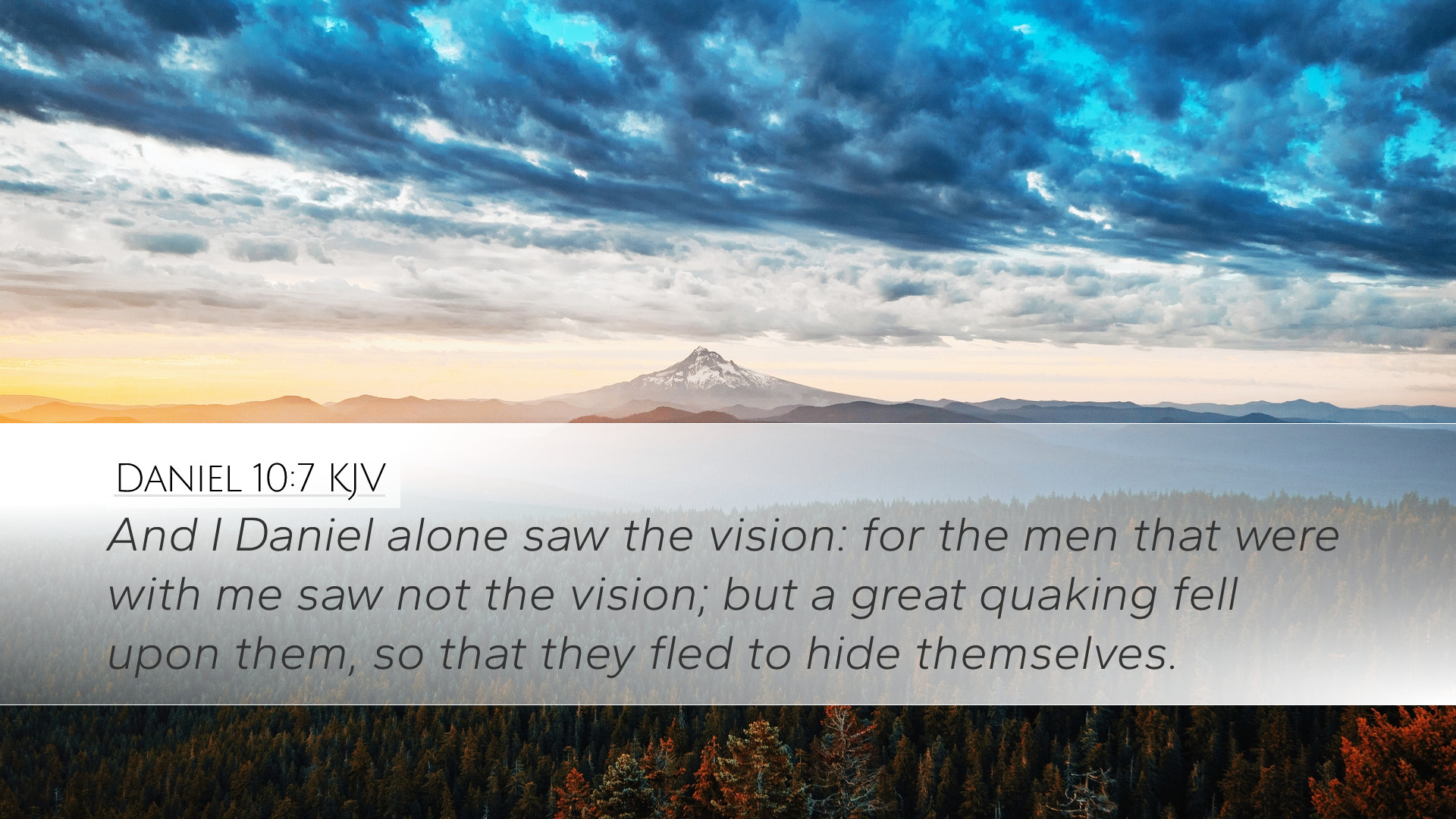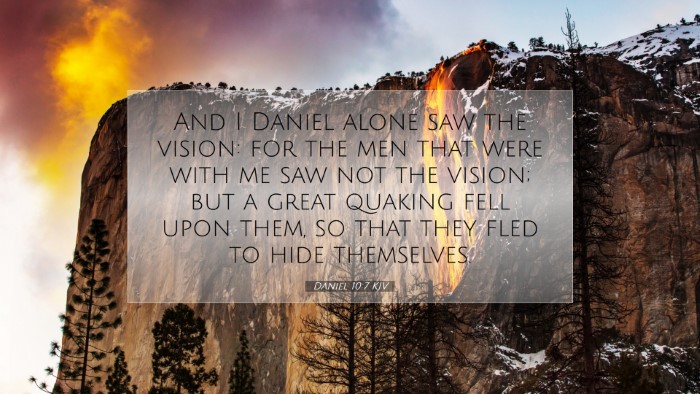Old Testament
Genesis Exodus Leviticus Numbers Deuteronomy Joshua Judges Ruth 1 Samuel 2 Samuel 1 Kings 2 Kings 1 Chronicles 2 Chronicles Ezra Nehemiah Esther Job Psalms Proverbs Ecclesiastes Song of Solomon Isaiah Jeremiah Lamentations Ezekiel Daniel Hosea Joel Amos Obadiah Jonah Micah Nahum Habakkuk Zephaniah Haggai Zechariah MalachiDaniel 10:7
Daniel 10:7 KJV
And I Daniel alone saw the vision: for the men that were with me saw not the vision; but a great quaking fell upon them, so that they fled to hide themselves.
Daniel 10:7 Bible Commentary
Commentary on Daniel 10:7
In this passage, we delve into the profound experiences of the prophet Daniel as he encounters a vision that deeply affects him. Daniel 10:7 reads:
"And I, Daniel, alone saw the vision; for the men that were with me saw not the vision; but a great quaking fell upon them, so that they fled to hide themselves."
Introduction
This verse is pivotal in understanding not only the prophetic experiences of Daniel but also the spiritual realities that often accompany divine revelation. The isolation Daniel experienced brings forth themes of divine calling, fear, and the weight of spiritual responsibility.
Exegesis of the Text
Daniel's unique experience emphasizes several important theological themes:
- Divine Revelation: Daniel is set apart to receive special insight into God's plans for Israel and future events. His solitude signifies the seriousness of the mission he is chosen for.
- Spiritual Responsiveness: The vision's intense nature causes fear among those around Daniel. This points to the awe and reverence that God's presence demands.
- Isolation in Calling: Daniel's alone-ness signifies that the burden of divine message often leads the called to experience solitude, illustrating the personal nature of God’s revelations.
Insights from Matthew Henry
Matthew Henry provides a critical reflection on the nature of Daniel's fear and the responses of those around him. He notes that:
- The fear experienced by Daniel’s companions serves as a reminder of the profound impact God's majesty and revelations can have on the human heart.
- Daniel, alone in his vision, illustrates the prophetic's unique calling, which often comes with deep personal consequence.
- Henry emphasizes the significance of understanding that divine revelations may not be comprehensible to all, highlighting the selective nature of divine understanding.
Insights from Albert Barnes
Albert Barnes discusses the implications of the vision on Daniel's health and his emotional state:
- Barnes notes that the distress causing Daniel's companions to flee underscores the intense spiritual realities that come with encounters with God.
- The notion of fear in the presence of God is a recurring theme in scripture. It shows the natural human reaction to divine holiness.
- He points out that this fearful reaction is indicative of the true nature of spiritual warfare and the unseen battles that often surround such revelations.
Insights from Adam Clarke
Adam Clarke adds an insightful dimension by emphasizing the historical and prophetic context of Daniel’s experience:
- Clarke highlights that this encounter signifies a preparation for the profound messages that are to be revealed, especially concerning the fate of Israel.
- His emphasis on the trembling and fleeing of those around Daniel suggests a spiritual disconnect; they were unprepared to witness the divine, which is a cautionary tale for readers today.
- Clarke’s commentary elaborates on the importance of personal readiness in the face of God’s revelations, asking readers to consider their own states before approaching God in prayer or reflection.
Thematic Reflections
Building on these insights, we observe overarching themes significant for pastoral and theological reflection:
- The Weight of Divine Revelation: Engaging with God’s messages requires sensitivity and a readiness that can often lead to discomfort or fear.
- Isolation in Spiritual Leadership: Those who are called to prophetic roles might often find themselves isolated from their peers, due to the weight of their calling and the revelations they receive.
- Human Response to the Divine: Reflecting on our own reactions to spiritual encounters, this verse invites pastors and scholars to assess the readiness of their own congregations or students in the face of divine truths.
Conclusion
Daniel 10:7 presents a rich tapestry of themes surrounding isolation, fear in the divine presence, and the nature of revelation. Engaging with this scripture through the lenses provided by Matthew Henry, Albert Barnes, and Adam Clarke enhances our understanding and provides valuable lessons for contemporary readers and students of the Bible. As we reflect on these insights, we are reminded of the weight of God's calling and the necessary posture of reverence, preparedness, and understandability in our spiritual pursuits.


